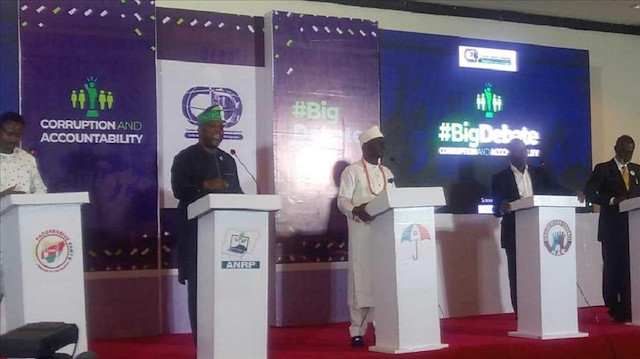
Nigeria must build institutions and legal frameworks that would deliver appropriate punishment to corrupt officials, the country’s political parties said on Monday.
Speaking at the #BigDebate town hall meeting on corruption and accountability ahead of the country's general elections slated for February and March, the parties admitted that effective corruption fight starts from cleaning up party funding, reducing influence of money in politics and using technology to open up government to the public.
Supported by MacAthur Foundation, the meeting was organized by the pan-West African civic group Center for Democracy and Development (CDD), with attendees from representatives of civil society, media and at least five political parties -- including the main opposition People's Democratic Party (PDP).
The ruling All Progressives Congress did not attend the meeting, drawing the ire of the other parties.
“There should be consequences for corruption. People get away with stealing public funds and this gives a wrong signal that corruption pays,” Omoyele Sowore, a presidential candidate of the little-known African Action Congress, said at a debate on corruption and accountability in the capital city Abuja.
“One major problem is that there are no proper enforcement and preventive measures to deter people from corruption. Our government will do this. We won't spare corrupt people […] We will deploy technology to ensure that assets declared by officials will be open to easy scrutiny by the public,” Sowore said.
Kazeem Afegbua, representative of the PDP, said there is a need to strip government of the discretionary powers in picking officials of the anti-graft bodies -- a practice he blamed for “lack of transparency and independence” of the agencies.
The Allied Congress Party of Nigeria (ACPN) called for value reorientation while the Youth Progressives Party called on officials to make their assets public and open for easy scrutiny.
“Open assets declaration is not negotiable for us. It is what our party preaches and practices,” Tope Fasua, presidential candidate of the Abundant Nigeria Renewal Party, said at the event.
Hassan Idayat, head of the CDD, said fighting corruption requires change in the country's value system so that citizens can collectively dislike corrupt practices and wage war against them.
According to her, corruption war cannot be won by simply arraigning suspects in the court.
“What President Muhammadu Buhari has been doing so far is the fight against impunity. There should be more to the fight against corruption,” she told Anadolu Agency.
Professor Jubrin Ibrahim, a former CDD chief and university teacher, said deterrence is key in the fight against corruption.
“We have accountability mechanisms but people break the law and nothing happens. That is the problem and once you don't punish people for corruption they continue to be corrupt,” he told Anadolu Agency on the sideline of the event.
“The point is that once people see that they will be punished for their bad deeds, they will be careful about what they do,” Ibrahim added.
Olanrewaju Suraju of the Civil Society Network Against Corruption agrees.
“There must be deterrence and this (also) requires that the rule of law be followed in the corruption fight. And anyone caught in corrupt practices must be made to face the law, whether you are with the ruling party or not,” he told Anadolu Agency.
In Nigeria, UNDP said in a recent report, that over $400 billion have been lost to corruption since 1960 when the country gained independence.
Previous and present governments in Nigeria have been accused of corruption. A Transparency International report in 2018 said corruption perception worsened between 2016 and 2017 in the country.
Nigeria ranked 148 out of 180 countries assessed in 2017 on the perception of corruption, the annual Corruption Perception Index (CPI) by the global watchdog group had stated.
The government blamed the perception on failure of the parliament to pass key anti-graft legislations.














